Fleurs du Mal Magazine


Or see the index
Selected for the National Poetry Series by Ada Limón, I Know Your Kind is a haunting, blistering debut collection about the American opioid epidemic and poverty in rural Appalachia.
 In West Virginia, fatal overdoses on opioids have spiked to three times the national average. In these poems, William Brewer demonstrates an immersive, devastating empathy for both the lost and the bereaved, the enabled and the enabler, the addict who knocks late at night and the brother who closes the door.
In West Virginia, fatal overdoses on opioids have spiked to three times the national average. In these poems, William Brewer demonstrates an immersive, devastating empathy for both the lost and the bereaved, the enabled and the enabler, the addict who knocks late at night and the brother who closes the door.
He shows us the high, at once numbing and transcendent: “this warm moment when I forget which part of me / I blamed.”
He shows us the overdose, when “the poppies on my arms / bruised red petals.” And he shows us the mourner, attending his high school reunion: “I guess we were underdressed: / me in my surf shoes / you in an urn.”
Underneath and among this multiplicity of voices runs the Appalachian landscape—a location, like the experience of drug addiction itself, of stark contrasts: beauty and ruin, nature and industry, love and despair.
Uncanny, heartbreaking, and often surreal, I Know Your Kind is an unforgettable elegy for the people and places that have been lost to opioids.
William Brewer is the author of I Know Your Kind, a winner of the 2016 National Poetry Series, as well as the chapbook Oxyana, which was awarded the Poetry Society of America Chapbook Fellowship 30 and Under. He is currently a Stegner Fellow at Stanford University. He was born and raised in West Virginia.
Poetry
I Know Your Kind
By William Brewer
Paperback $16.00
ISBN: 978-1-57131-495-6
Publish Date: Sept. 2017
Pages: 96
Size:5.5 × 8.5 × 0.25 in
Milkweed Books
fleursdumal.nl magazine
More in: - Book News, - Bookstores, Archive A-B, Art & Literature News, EDITOR'S CHOICE, Opium-Eaters

Is there for Honest Poverty
1.
Is there for honest poverty
That hings his head, an’ a’ that ?
The coward slave, we pass him by—
We dare be poor for a’ that!
For a’ that, an’ a’ that,
Our toils obscure, an’ a’ that,
The rank is but the guinea’s stamp,
The man’s the gowd for a’ that.
2.
What though on hamely fare we dine,
Wear hoddin grey, an’ a’ that ?
Gie fools their silks, and knaves their wine—
A man’s a man for a’ that.
For a’ that, an’ a’ that,
Their tinsel show, an’ a’ that,
The honest man, tho’ e’er sae poor,
Is king o’ men for a’ that.
3.
Ye see yon birkie ca’d ‘a lord,’
Wha struts, an’ states, an’ a’ that ?
Tho’ hundreds worship at this word,
He’s but a cuif for a’ that.
For a’ that, an’ a’ that,
His ribband, star, an’ a’ that,
The man o’ independent mind,
He looks an’ laughs at a’ that
4.
A prince can mak a belted knight,
A marquis, duke, an’ a’ that!
But an honest man’s aboon his might—
Guid faith, he mauna fa’ that!
For a’ that, an’ a’ that,
Their dignities, an’ a’ that,
The pith o’ sense an’ pride o’ worth
Are higher rank than a’ that.
5.
Then let us pray that come it may
(As come it will for a’ that)
That Sense and Worth o’er ‘ a’ the earth
Shall bear the gree an’ a’ that!
For a’ that, an’ a’ that,
It’s comin yet for a’ that,
That man to man the world o’er
Shall brithers be for a’ that.
Robert Burns (1759 – 1796)
Is there for Honest Poverty
fleursdumal.nl magazine
More in: Archive A-B, Burns, Robert

Mr. V. Van Gogh last painting
He was super ill, the paint slivered and writhed
bad blood worms on rough canvas slicing
his brain out of deflecting eyes, nail-bitten fingers.
From in the curly mind, out of black chemistry
and dodgy pharmacy, a loaded sharp tongue
despaired, slammed a miserable self-realization
of the road’s inadequacy, of the dissatisfaction,
of skittish skills, the ongoing failure with women.
From loathing, the dust of crumbling charcoal
and blunting pencil, the mass rank alcohol drank,
the acrid cigarettes, bad behaviour with friends,
family, his failure, the verdict of good judgement
just left him with an empty chair far from home.
The analysis of the doctors, the screech of trees,
the tar-coloured crows beating their deathly wings.
He could no longer see the actual investment
away from a loaded pistol. The experiment of death
won battles over him and followed too closely.
The canvas could not fill life when the sun shone hard,
the colours chattered, which was unbelievable but true.
He often left his charnel house lamenting with flowers
with pity, with the irony of the age to come, with freedom
he never had, the love he could not sustain.
The hue turned darker, blacker and then he was no more.
07.10.08
Vincent Berquez
Vincent Berquez is a London–based artist and poet
fleursdumal.nl magazine
More in: Archive A-B, Berquez, Vincent, Vincent Berquez, Vincent van Gogh

Growing Old
But now at thirty years my hair is grey—
(I wonder what it will be like at forty ?
I thought of a peruke the other day—)
My heart is not much greener ; and, in short, I
Have squandered my whole summer while ’twas May,
And feel no more the spirit to retort ; I
Have spent my life, both interest and principal,
And deem not, what I deemed, my soul invincible.
No more—no more—Oh ! never more on me
The freshness of the heart can fall like dew,
Which out of all the lovely things we see
Extracts emotions beautiful and new ;
Hived in our bosoms like the bag o’ the bee.
Think’st thou the honey with those objects grew ?
Alas ! ’twas not in them, but in thy power
To double even the sweetness of a flower.
No more—no more—Oh! never more my heart,
Canst thou be my sole world, my universe !
Once all in all, but now a thing apart,
Thou canst not be my blessing or my curse :
The illusion’s gone for ever, and thou art
Insensible, I trust, but none the worse,
And in thy stead I’ve got a deal of judgement,
Thou Heaven knows how it ever found a lodgement.
My days of love are over ; me no more
The charms of maid, wife, and still less of widow,
Can make the fool of which they made before,—
In short, I must not lead the life I did do ;
The credulous hope of mutual minds is o’er,
The copious use of claret is forbid too,
So for a good old-gentlemanly vice,
I think I must take up with avarice.
Ambition was my idol, which was broken
Before the shrines of Sorrow, and of Pleasure ;
And the two last have left me many a token
O’er which reflection may be made at leisure :
Now, like Friar Bacon’s Brazen Head, I’ve spoken,
‘Time is, Time was, Time’s past’ : a chymic treasure
Is glittering Youth, which I have spent betimes—
My heart in passion, and my head on rhymes.
What is the end of Fame ? ’tis but to fill
A certain portion of uncertain paper :
Some liken it to climbing up a hill,
Whose summit, like all hills, is lost in vapour ;
For this men write, speak, preach, and heroes kill,
And bards burn what they call their ‘midnight taper’,
To have, when the original is dust,
A name, a wretched picture and worse bust.
What are the hopes of man ? Old Egypt’s King
Cheops erected the first Pyramid
And largest, thinking it was just the thing
To keep his memory whole, and mummy hid ;
But somebody or other rummaging,
Burglariously broke his coffin’s lid :
Let not a monument give you or me hopes,
Since not a pinch of dust remains of Cheops.
But I, being fond of true philosophy,
Say very often to myself, ‘Alas!
All things that have been born were born to die,
And flesh (which Death mows down to hay) is grass ;
You’ve passed your youth not so unpleasantly,
And if you had it o’er again—’twould pass—
So thank your stars that matters are no worse,
And read your Bible, sir, and mind your purse.’
Lord Byron (1788-1824)
Growing Old
fleursdumal.nl magazine
More in: Archive A-B, Byron, Lord
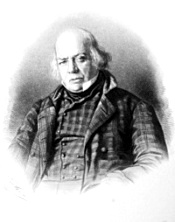
Pierre-Jean de Béranger
Le roi d’Yvetot
Il était un roi d’Yvetot
Peu connu dans l’histoire ;
Se levant tard, se couchant tôt,
Dormant fort bien sans gloire,
Et couronné par Jeanneton
D’un simple bonnet de coton,
Dit-on.
Oh ! oh ! oh ! oh ! ah ! ah ! ah ! ah !
Quel bon petit roi c’était là !
La, la.
Il faisait ses quatre repas
Dans son palais de chaume,
Et sur un âne, pas à pas,
Parcourait son royaume.
Joyeux, simple et croyant le bien,
Pour toute garde il n’avait rien
Qu’un chien.
Oh ! oh ! oh ! oh ! ah ! ah ! ah ! ah
Quel bon petit roi c’était là !
La, la.
Il n’avait de goût onéreux
Qu’une soif un peu vive ;
Mais en rendant son peuple heureux,
Il faut bien qu’un roi vive.
Lui-même, à table et sans suppôt,
Sur chaque muid levait un pot
D’impôt.
Oh ! oh !oh !oh ! ah ! ah ! ah ! ah !
Quel bon petit roi c’était là !
La, la.
Aux filles de bonnes maisons
Comme il avait su plaire,
Ses sujets avaient cent raisons
De le nommer leur père
D’ailleurs il ne levait de ban
Que pour tirer quatre fois l’an
Au blanc.
Oh ! oh ! oh ! oh ! ah ! ah ! ah ! ah !
Quel bon petit roi c’était là !
La, la.
Il n’agrandit point ses états,
Fut un voisin commode,
Et, modèle des potentats,
Prit le plaisir pour code.
Ce n’est que lorsqu’il expira
Que le peuple qui l’enterra
Pleura.
Oh ! oh ! oh ! oh ! ah ! ah ! ah ! ah !
Quel bon petit roi c’était là !
La, la.
On conserve encor le portrait
De ce digne et bon prince ;
C’est l’enseigne d’un cabaret
Fameux dans la province.
Les jours de fête, bien souvent,
La foule s’écrie en buvant
Devant :
Oh ! oh ! oh ! oh ! ah ! ah ! ah ! ah !
Quel bon petit roi c’était là !
La, la.
Chanson écrite en mai 1813.
Pierre-Jean de Béranger (1780-1857)
Le roi d’Yvetot
Toutes les chansons de Béranger (1843)
fleursdumal.nl magazine
More in: Archive A-B, Béranger, Pierre-Jean de, MUSIC
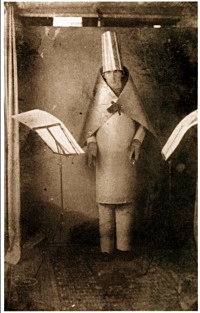
bfirr
bfirr bfirr
ongog
rorr sss
dumpa
feif dirri
chu gaba
raur
ss
Hugo Ball
(1886-1927)
gedicht
fleursdumal.nl magazine
More in: Archive A-B, Ball, Hugo, DADA, Dada, Dadaïsme

Retour
De klokken roepen als vanouds maar er zijn minder oren.
Verduiveld goed nog weet hij hoe de superplie over het
schoon geschoren jongenshalsje schoof. In kalm ritme
vol geloof ging de dag in deze Heilig Hartkerk van start
als alle dagen. Naast de sacristie vertoeft zijn vingerafdruk
nog ergens op de knoppen voor het galmen. Medeplichtig.
Die jonge jaren raken meer en meer beduimeld,
maar tuimelen soms de draad van geheugen even
wichtig op. Dan proeft hij. Hoe vroeger een huis
waar hij nog wel eens langs kuierde thuis was,
langgeleden inzicht met hete huiver stolt
als ei in kokend water. Geen angst voor later.
Bert Bevers
Uit: Onaangepaste tijden,
Zinderend, Bergen op Zoom, 2006
Bert Bevers is a poet and writer who lives and works in Antwerp (Be)
fleursdumal.nl magazine
More in: Archive A-B, Bevers, Bert

Rosa Parks
She told a big white man
a big no right in his face.
Nose to nose and quite scary
as if a lynching could result.
She didn’t flinch and said
she could’ve
and should’ve
be able to do this
one easy thing that day.
There she sat, little and grand,
and although she was the first
to sit on a bus in the white seats
she was bayed at as if this symbol
was like rejecting the public stocks.
This small piece of America
became everything,
a wave began and was unstoppable.
I don’t know much else about all this
but I am interested in my liberty.
She could have said it like that.
21.03.04
Vincent Berquez
Vincent Berquez is a London–based artist and poet
fleursdumal.nl magazine
More in: Archive A-B, Berquez, Vincent, Vincent Berquez
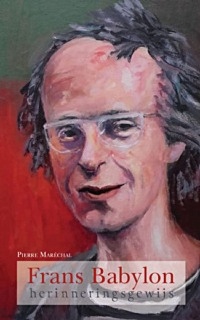 Volgens Pierre Maréchal was de Brabantse dichter Frans Babylon een zieke poète maudit die zowel de poëzie als de kunst stimuleerde te vernieuwen. Brabant liep sterk achter bij de ontwikkelingen.
Volgens Pierre Maréchal was de Brabantse dichter Frans Babylon een zieke poète maudit die zowel de poëzie als de kunst stimuleerde te vernieuwen. Brabant liep sterk achter bij de ontwikkelingen.
Uiteindelijk verwierp hij de traditionele dichtstijlen en schreef hij gedichten op gevoel. Met vrienden vormde hij de Bredero-club en stimuleerde hij kunstenaars om zich verder te ontwikkelen. Babylon bevorderde eveneens de ontwikkeling van openbare kunstexposities voor groot publiek.
Naast Brabant en Amsterdam was Frankrijk een geliefde omgeving. Ondanks zijn bipolaire stoornis en dankzij zijn creativiteit bracht Frans Babylon veel tot stand.
Pierre Maréchal werkte onder meer voor de internationale trekvogel-bescherming. Ruim twintig jaar is hij actief bezig met poëzie. Hij schrijft en organiseert maandelijks diverse podia en optredens. De laatste jaren doet hij dit bij de PoëzieClub Eindhoven en de werkgroep ‘Boekenkast’. Frans Babylon – herinneringsgewijs is typisch zo’n onderwerp. Het is een project over een bekende en tegelijk een minder bekende dichter, wiens daden van betekenis waren voor de ontwikkeling van de poëzie en de kunsten in het zuiden van ons land.
Pierre L.Th.A. Maréchal
Frans Babylon – herinneringsgewijs
Biografie Frans Babylon,
pseudoniem van Franciscus Gerardus Jozef Obers (1924 – 1968)
ISBN: 978-94-0223-720-7
Paperback 12,5 x 20 cm
186 pag. – 2017
€ 19,99
fleursdumal.nl magazine
More in: *Archive Les Poètes Maudits, - Archive Tombeau de la jeunesse, - Book News, Archive A-B, Archive A-B, Art & Literature News, Babylon, Frans, Brabantia Nostra, Frans Babylon

Pierre-Jean de Béranger
Le petit homme gris
Il est un petit homme,
Tout habillé de gris,
Dans Paris ;
Joufflu comme une pomme,
Qui, sans un sou comptant,
Vit content,
Et dit : Moi, je m’en…
Et dit : Moi, je m’en…
Ma foi, moi, je m’en ris !
Oh ! qu’il est gai (bis),
Le petit homme gris !
A courir les fillettes,
A boire sans compter,
A chanter,
Il s’est couvert de dettes ;
Mais quant aux créanciers,
Aux huissiers,
Il dit : Moi, je m’en…
Il dit : Moi, je m’en…
Ma foi, moi, je m’en ris !
Oh ! qu’il est gai [bis),
Le petit homme gris !
Qu’il pleuve dans sa chambre,
Qu’il s’y couche le soir
Sans y voir ;
Qu’il lui faille en décembre
Souffler, faute de bois,
Dans ses doigts ;
Il dit : Moi, je m’en…
Il dit : Moi, je m’en…
Ma foi, moi, je m’en ris !
Oh ! qu’il est gai (bis),
Le petit homme gris !
Sa femme, assez gentille,
Fait payer ses atours
Aux amours :
Aussi plus elle brille,
Plus on le montre du doigt.
Il le voit,
Et dit : Moi, je m’en…
Et dit : Moi, je m’en…
Ma foi, moi, je m’en ris !
Oh ! qu’il est gai (bis),
Le petit homme gris !
Quand la goutte l’accable
Sur un lit délabré,
Le curé,
De la mort et du diable
Parle à ce moribond,
Qui répond :
Ma foi, moi, je m’en…
Ma foi, moi, je m’en…
Ma foi, moi, je m’en ris !
Oh ! qu’il est gai (bis),
Le petit homme gris !
Pierre-Jean de Béranger (1780-1857)
Le petit homme gris
Toutes les chansons de Béranger (1843)
fleursdumal.nl magazine
More in: Archive A-B, Béranger, Pierre-Jean de
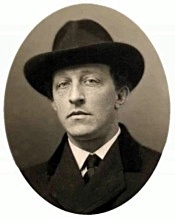
Aleksandr Blok
(1880–1921)
Wat is het zwaar
Ginds is een mens verbrand. (Fet)
Wat is het zwaar om hier op aard te zijn,
te doen alsof je niet al omgekomen bent,
steeds dit tragisch spel van angst en pijn
te zien voor wie het leven nog niet kent,
en steeds in boze dromen, nacht na nacht,
te vragen naar wat vragen niet verdraagt,
opdat hun in der schone kunsten pracht
de weerschijn van een vurig leven daagt!
Aleksandr Blok, Как тяжело ходить среди людей, 1910
Vertaling Paul Bezembinder 2016
Paul Bezembinder: zijn gedichten en vertalingen verschenen in verschillende (online) literaire tijdschriften. Zie meer op zijn website: www.paulbezembinder.nl
fleursdumal.nl magazine
More in: Archive A-B, Blok, Blok, Aleksandr
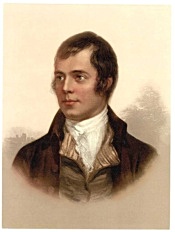
Robert Burns
Address to Edinburgh
1.
Edina! Scotia’s darling seat!
All hail thy palaces and tow’rs,
Where once, beneath a Monarch’s feet,
Sat Legislation’s sov’reign pow’rs :
From marking wildly-scatt’red flow’rs,
As on the banks of Ayr I stray’d,
And singing, lone, the ling’ring hours,
I shelter in thy honor’d shade.
2.
Here Wealth still swells the golden tide,
As busy Trade his labours plies ;
There Architecture’s noble pride
Bids elegance and splendour rise :
Here Justice, from her native skies,
High wields her balance and her rod ;
There Learning, with his eagle eyes,
Seeks Science in her coy abode.
3.
Thy sons, Edina, social, kind,
With open arms the stranger hail ;
Their views enlarg’d, their lib’ral mind,
Above the narrow, rural vale ;
Attentive still to Sorrow’s wail,
Or modest Merit’s silent claim :
And never may their sources fail!
And never Envy blot their name!
4.
Thy daughters bright thy walks adorn,
Gay as the gilded summer sky,
Sweet as the dewy, milk-white thorn,
Dear as the raptur’d thrill of joy!
Fair Burnet strikes th’ adoring eye,
Heav’n’s beauties on my fancy shine :
I see the Sire of Love on high,
And own His work indeed divine!
5.
There, watching high the least alarms,
Thy rough, rude fortress gleams afar ;
Like some bold vet’ran, grey in arms,
And mark’d with many a seamy scar :
The pond’rous wall and massy bar,
Grim-rising o’er the rugged rock,
Have oft withstood assailing war,
And oft repell’d th’ invader’s shock.
6.
With awe-stuck thought and pitying tears,
I view that noble, stately dome,
Where Scotia’s kings of other years,
Fam’d heroes! had their royal home :
Alas, how chang’d the times to come!
Their royal name low in the dust!
Their haplesss race wild-wand’ring roam!
Tho’ rigid Law cries out: ‘’Twas just!’
7.
Wild beats my heart to trace your steps,
Whose ancestors, in days of yore,
Thro’hostile ranks and ruin’d gaps
Old Scotia’s bloody lion bore:
Ev’n I, who sing in rustic lore,
Haply my sires have left their shed,
And fac’d grim Danger’s loudest roar,
Bold-following where your fathers led!
8.
Edine! Scotia’s darling seat!
All hail thy palaces and tow’rs ;
Where once, beneath a Monarch’s feet,
Sat Legislation’s sov’reign pow’rs :
From marking wildly-scatt’red flow’rs,
As on the banks of Ayr I stray’d,
And singing, lone, the ling’ring hours,
I shelter in thy honour’d shade.
Robert Burns (1759 – 1796)
Address to Edinburgh
fleursdumal.nl magazine
More in: Archive A-B, Burns, Robert
Thank you for reading Fleurs du Mal - magazine for art & literature